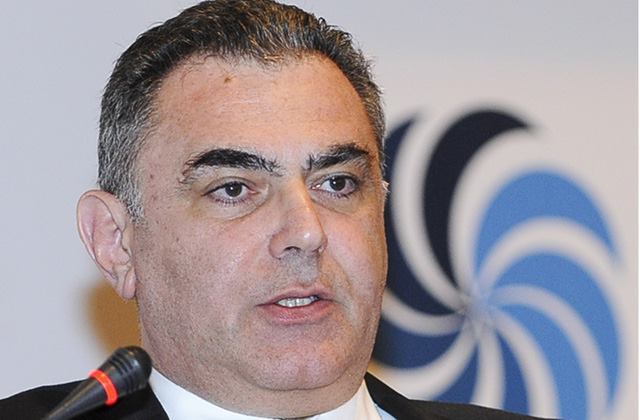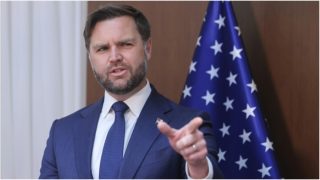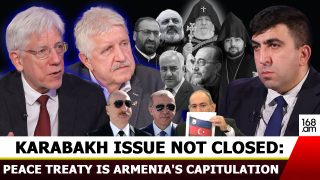“A sense of realism emerged in Armenian policy towards Russia, lessons have been learnt, however, it is likely to be forgotten quite soon”

Interview with Dennis Sammut, Executive Director of LINKS (Dialogue, Analysis and Research), based in Oxford.
Mr Sammut, you know that large-scale clashes unleashed in Karabakh conflict zone on 2 April, when presidents of Armenia and Azerbaijan were in Washington D.C. As usual, we saw Russia’s active mediation, though the conflicting sides realize Russia pursues its own interests in the South Caucasus. However, the most interesting point is that OSCE MG Co-chairs, and especially Western ones were commenting on the situation that it was usual escalation, and most Western diplomats pay little attention to this protracted conflict in the Caucasus, giving the impression that Nagorno-Karabakh issue is intractable, but not especially dangerous. There is an impression that The West has handed the settlement wheel to Russia. What do you think about this? I wonder, does the West agree on the Russian scenario of Karabakh conflict settlement?
In both the European Union and the United States there is a certain amount of crises and conflict fatigue, due to the many areas of instability in different parts of the world, and especially around Europe. So you are right to say that there should have been more attention to the Karabakh conflict than has been the case. The idea that we have the OSCE Minsk Group Co-chair mechanism and that this is enough to at least contain the problem was always, in my opinion, flawed. What happened in the last weeks proved this.
This does not mean that Russia has been given a free hand to push its own “scenario”, as you call it.
Do you see disagreements between Russia and the West in the Karabakh conflict settlement process? And in what kind of questions do you observe those disagreements, taking into consideration, that Sergey Lavrov touched upon Kazan document in Yerevan on 22 April? He also mentioned the 1994-1995 ceasefire documents, however, mentioning that Russia has some suggestions from 2011 and it considers them rather important.
One of the amazing things about the Karabakh conflict is that on the face of it there is complete agreement in the international community about the solution, and the mechanism to achieve it – namely full support for the Madrid principles based on mediation through the OSCE Minsk Process. The problem is that Russia is pursuing two agendas – one that is in harmony with the rest of the international community, and a much more sinister agenda based on what it perceives to be its own hegemonic interests in the South Caucasus.
So, Russia preaches peace whilst flooding the region with its most sophisticated armaments; it wants international support for its peace efforts but does not want others to be part of the future solution. It wants to work in partnership, whilst trying to exclude everybody else from the region. These Russian contradictions also reflect themselves in the way that Russia deals with Armenia and Azerbaijan.
Many Armenian experts, officials think that Russia is interested in putting peacekeepers in Karabakh, Russia is not interested in the settlement of the conflict, as it sells armaments to both Armenia and Azerbaijan. What do you think of Russia’s interests in Karabakh? Do the conflict sides have leverages to limit Russia’s influence? What can Armenia and Azerbaijan do for that?
Russia is interested in Karabakh issue only in as much as this impacts its wider relations with both Armenia and Azerbaijan. The political leaderships in both Baku and Yerevan still believe that they can manage their relations with Russia in a way that works in their favour, when it comes to Karabakh. It seems both underestimated the extent Russia is pushing its own agenda, so it is quite possible both will end up being very disappointed.
What may the conflicting sides expect from the EU, represented in the OSCE Minsk Group by France, and how do you assess Europe’s position?
First of all, you are completely wrong. France does not represent the EU in the Minsk Process, in the same way that Russia does not represent the Eurasian Economic Union (EEU).
The European Union (EU) is the most important political and economic organisation on the European continent, and its absence from the Minsk Group is no longer acceptable in geopolitical terms. The EU is also the most important partner for civil society throughout the entire South Caucasus. Since on Karabakh societal changes are an essential part for any settlement of the conflict going forward, the EU has a role to play that cannot be substituted by anyone else, least of all Russia.
But if the conflict sides want the EU to play a more active role in the Karabakh conflict settlement process they should say so. I ask you directly, have you ever heard your President or Foreign Minister say that the EU should play a more active role in resolving the Karabakh conflict? They should. If both sides want the EU to be more active in helping them resolve the conflict they need to say so clearly, in which case I have no doubt the response of the EU will be positive. As High Representative Federica Mogherini stated in the European Parliament a few days ago, the EU is ready to step up its engagement, if necessary.
Serzh Sargsyan, RA President, gave an interview to Bloomberg over the recent eruption of violence in Nagorno Karabakh conflict zone. It’s “unreasonable” for Armenia to resume peace talks with Azerbaijan over the disputed territory without security guarantees because “the situation is entirely different now,” he said. “While the chief of the defense staff in Moscow mediated the cease-fire talks, there’s no place for Russian peacekeepers in the conflict zone to separate the two sides, Sargsyan said. Talk of deploying Russian forces “wasn’t entirely without grounds” in previous peace negotiations, though “I don’t see any such opportunity” now, he said. He also said that Armenia was ready to give 5 regions to Azerbaijan in Kazan, but Azerbaijan refused. After this war Sargsyan has also toughened his rhetorics against the policy of Russia to sell armaments both to Armenia and to Azerbaijan. How do you assess this new disposition of the Armenian president?
As somebody, who strongly believes that there is no solution to the Karabakh conflict through war and violence I do not think that there is ever a time when dialogue and negotiations are not a good idea. The two sides need to remain engaged with the peace process.
After the events of the last four weeks one can detect a sense of realism emerging in Armenian policy towards Russia. Lessons have been learnt. Unfortunately, based on past experience, it is likely they will be forgotten quite soon.
What should we expect from Co-chairs, working on rehabilitation of peace talks and what should they do in this hazardous situation?
The diplomats from France, Russia and the United States who Co-chair the OSCE Minsk Process are trying to reduce tensions on the line of contact and re-establish dialogue between the sides. But their work is more difficult today, than it was one month ago.
By Araks Martirosyan

























